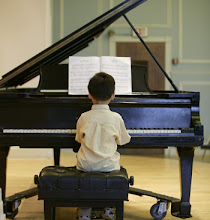Our Fall newsletter is in homes and at all the branches (and on our website, too) with stories of how our students, faculty, staff and donors are making an impact in the practice rooms, classrooms and the outside world. We included an item on a major accomplishment by a Settlement alum: Quiara Alegria Hudes winning the Pulitzer Prize for Drama for her play "Water by the Spoonful."
 |
| Quiara Alegria Hudes, Settlement alum and winner of the 2012 Pulitzer Prize for Drama |
We were very excited to hear of another Settlement alum going on to great things in life, not just in music. We caught another interview, by 215 magazine, that reveals more of her life as a playwright, but we wanted to know more about her time studying here and on the role music plays in her life. She filled us in on that and much more.
Q: When did you first
begin studying music? What led you to start in the first place, and what led
you study at Settlement?
QH: I was family-trained and self-trained. My aunt and uncle
were musicians and exposed me to the widest range of excellent music imaginable:
the Dirty Dozen Brass Band, Etta James, Steel Pulse, Bach solo cello... I had
absorbed all that by the time I reached ten years old. To me, music was an
endless world of sound and possibility. There were no boundaries. I took my
first formal piano lesson in the eighth grade and found my way to Settlement by
the ninth grade.
Q: When did you first
move from writing music to writing plays? How are the two related?
QH: Music and literacy go hand in hand. My musical studies
taught me concentration, listening, and the practice of silence. Those skills
are important as a writer as well.
Q: What impact do you
feel music and music education have in other areas of the arts? What about in
areas outside of the arts?
QH: Since I didn't begin my formal music education until eighth
grade, I was always behind the curve in terms of classical chops. I was never
going to be a world-class concert pianist. That being said, every moment of my
music education made me a better student, independent thinker, and citizen.
Practicing rigorously every day taught me to motivate myself and structure my
time. Getting better day by day, scale by scale, gave me a great deal of
confidence, and also made me realize the connection between hard work and
improvement.
I have never had the illusion that talent or dreaming would earn
me much. I knew those were starting lines for a life spent working hard and
accomplishing goals. I savor the work ethic that music lessons instilled in me,
in part because I learned how incredibly fun it can be to get better at something,
step by step, and to use my creativity rigorously.
Q: What role does music
play in your life and work now? Do you still write music or practice piano?
QH: I am not a musician now. I am a music lover, though. It's
important for parents to believe in the value of musical training as a stepping
stone to any kind of life. Don't send your kid to violin lessons just so they
can play in the Philharmonic when they grow up; send them to violin lessons for
all the pathways it may open them to.
Q: What impact has the
Pulitzer had on your writing and your career?
QH: We are yet to see. Today I spent the day writing. I made my
current project a little better. I had a few new ideas. That's what I'll do
tomorrow as well.
Q: Any other thoughts or
memories of your time at Settlement?
QH: I took piano with [Ann Stookey and Joseph W. Waz, Jr. Distinguished Faculty Chair] Dolly Krasnopolsky. She had nothing but
the highest standards for me and would not accept if I had not worked up to my
potential. It was tough love. She always challenged me. She banged my fingers
into those keys, and told me to imagine every finger was a different member of
the orchestra. She changed my life.







